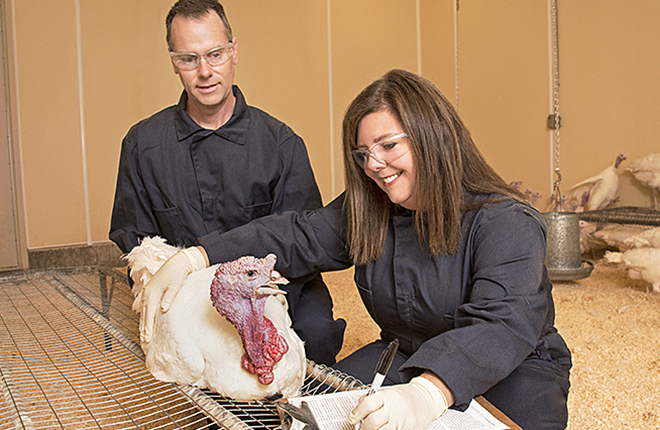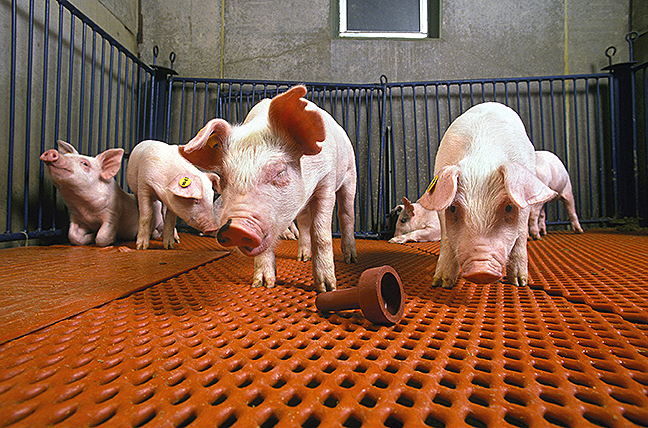New Vaccine Fights Multiple Salmonella Types
Some types of Salmonella cause disease in food animals. Other types cause foodborne disease in humans. A new vaccine developed by Agricultural Research Service (ARS) scientists in Ames, Iowa, protects pigs against both types of Salmonella.
Several Salmonella vaccines are currently licensed in the United States, but they generally offer protection against only one type of the pathogen. It's easiest to make a vaccine for a single type of Salmonella, but this can leave pigs vulnerable to other types that may infect them as well.
"That's probably the biggest hurdle in trying to develop Salmonella vaccines," says Shawn Bearson, a microbiologist in ARS's Food Safety and Enteric Pathogens Research Unit in Ames. "But another challenge is that the vaccines need to reduce Salmonella types that don't cause disease in pigs, but do cause foodborne disease in humans. Those are called 'commensal' organisms."
Commensal Salmonella live in the gastrointestinal tract of a food animal without making it sick. However, when the animal goes to market or its manure is used to fertilize food crops that are not cooked before they are eaten, the bacterium then poses a foodborne risk to humans.
To address this two-fold threat, Shawn Bearson teamed with Brad Bearson, a microbiologist who works in ARS's Agroecosystems Management Research Unit, also in Ames. Together, they created a new vaccine that protects food animals against commensal and disease-causing types of Salmonella.
Experiments showed that the new vaccine was effective against two types of Salmonella, Typhimurium and Choleraesuis, in pigs. It also protected turkeys against Typhimurium and a multidrug-resistant Salmonella type, Heidelberg—the bacterium responsible for a 2011 outbreak in ground turkey that led to one of the largest meat recalls in U.S. history.
|
|
"Typhimurium is one of the most prevalent causes of food poisoning in humans," Brad Bearson says. "It's also a common commensal in pigs, poultry, and cattle."
In pigs, Choleraesuis causes a severe disease that can kill the animals, he says. It was the source of major U.S. and global outbreaks for swine producers in the 1980s and 1990s. At that time, vaccines derived from Choleraesuis were developed to combat the disease.
"If an outbreak occurs, our vaccine could provide protection against Choleraesuis and Typhimurium in pigs," Brad Bearson says. "Our new vaccine is also a DIVA—Differentiation of Infected from Vaccinated Animals—meaning it shouldn't interfere with specific tests producers use to detect natural Salmonella infections in their pigs."
In other words, when producers test animals that have been vaccinated with current vaccines, they test positive. Pigs vaccinated with the new vaccine do not test positive. Thus, a producer can differentiate vaccinated animals from those that have been naturally exposed to Salmonella.
Although the vaccine has been tested against only three types of Salmonella, it's likely to protect against many other types of Salmonella in different food animals, according to the scientists.
"We tried to design the vaccine to address the needs of the swine industry. In doing so, not only did we develop a vaccine that is not Salmonella-type specific, but we also made one that's not food-animal species specific," says Brad Bearson.
A patent application has been filed by ARS for this innovative vaccine technology. — By Sandra Avant, ARS Office of Communications.
Key Facts
- Most current animal vaccines protect against just one type of Salmonella.
- ARS scientists developed a vaccine that protects against several types of Salmonella.
- The vaccine works in pigs and turkeys and is likely to work in other animals.
- The vaccine will reduce animal disease and human foodborne illness.
Full Story








